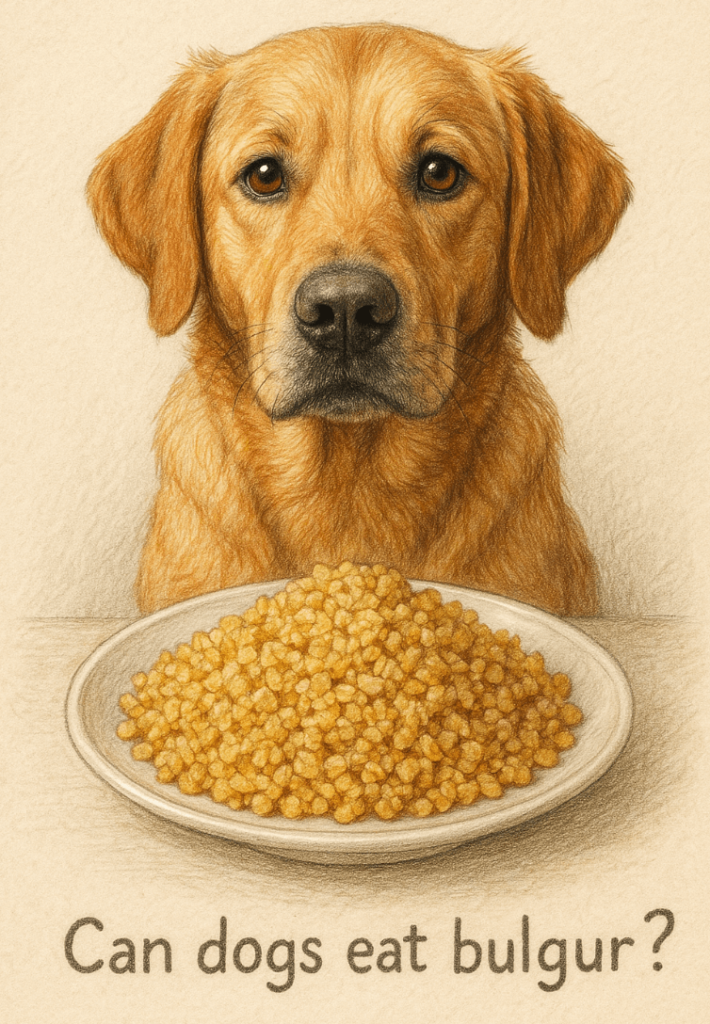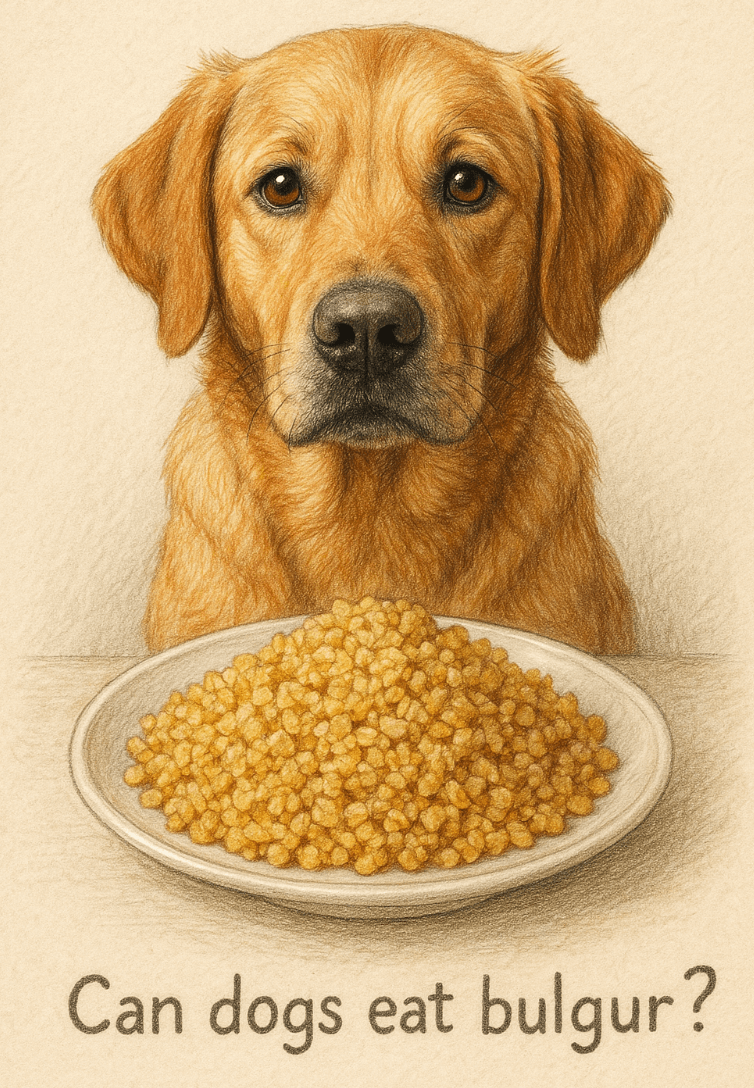Can Dogs Eat Bulgur? A Nutritious Addition to Their Diet?
As pet owners, we’re always on the lookout for healthy and safe foods to share with our furry friends. One food that often sparks curiosity is bulgur—a nutritious whole grain packed with fiber, protein, and essential nutrients. But can dogs eat bulgur? Is it safe, and does it offer any health benefits for our canine companions? In this blog post, we’ll explore everything you need to know about feeding bulgur to your dog. From its nutritional value to preparation tips and potential risks, we’ll help you make an informed decision about incorporating this wholesome grain into your dog’s diet.
Nutritional Benefits of Bulgur for Dogs
Bulgur is a highly nutritious grain that can provide several health benefits for dogs when fed in moderation. Here’s how this whole grain can support your dog’s overall well-being.
Rich in Fiber:
The high fiber content in bulgur supports healthy digestion and can help regulate bowel movements, reducing the risk of constipation or diarrhea.Low in Fat:
Bulgur is naturally low in fat, making it a great option for dogs that need to maintain or lose weight without compromising nutrition.Packed with Protein:
As a plant-based protein source, bulgur helps support muscle development and repair, especially beneficial for active dogs.Vitamins and Minerals:
Bulgur contains essential nutrients like magnesium, iron, and B vitamins, which contribute to energy production and immune system health.Gluten Content Consideration:
While bulgur contains gluten, most dogs tolerate it well unless they have a specific sensitivity or allergy. Always monitor for adverse reactions.
Incorporating bulgur into your dog’s diet can provide a nutrient boost, but moderation and proper preparation are key to ensuring their safety.
How to Safely Feed Bulgur to Your Dog
If you decide to introduce bulgur to your dog’s diet, it’s important to prepare and serve it in a way that maximizes its benefits while minimizing risks. Follow these guidelines for a safe and enjoyable experience.
Cook It Plain:
Avoid adding salt, butter, spices, or other seasonings that could upset your dog’s stomach. Serve bulgur plain and fully cooked.Start with Small Portions:
Begin with a small amount to see how your dog reacts. Gradually increase the portion size if they tolerate it well.Mix with Other Foods:
Combine bulgur with your dog’s regular food or mix it with vegetables like carrots or green beans for added flavor and nutrition.Avoid Overfeeding:
Too much bulgur can lead to digestive upset or weight gain. Stick to a few tablespoons per serving, depending on your dog’s size.Check for Allergies:
Watch for signs of allergies or intolerance, such as itching, vomiting, or diarrhea, after introducing bulgur. Consult your vet if symptoms occur.
By following these steps, you can safely incorporate bulgur into your dog’s meals while keeping their health a top priority.
Check this guide 👉Can Dogs Eat Walleye? Best 7 Expert Tips!
Check this guide 👉Can Dogs Eat Margarine? Best 7 Expert Tips!
Check this guide 👉Can Dogs Eat Juniper Berries? Best 7 Expert Tips!

Benefits of Feeding Bulgur to Dogs | Potential Risks of Feeding Bulgur to Dogs |
|---|---|
High in fiber for better digestion | Possible gluten sensitivity in some dogs |
Low in fat, ideal for weight management | Risk of digestive upset if overfed |
Rich in plant-based protein | Allergic reactions in rare cases |
Packed with essential vitamins | Improperly prepared bulgur may cause issues |
Supports energy and immune health | Can lead to obesity if not portion-controlled |
Signs Your Dog May Not Tolerate Bulgur
While many dogs enjoy bulgur without issue, some may experience adverse reactions. Recognizing these signs early can prevent discomfort and ensure your dog’s safety.
Digestive Upset:
Symptoms like vomiting, diarrhea, or excessive gas may indicate that your dog’s digestive system can’t handle bulgur.Itching or Skin Irritation:
If your dog starts scratching excessively or develops red, irritated skin, it could be a sign of an allergic reaction.Lethargy or Loss of Appetite:
A sudden lack of energy or refusal to eat may signal that bulgur doesn’t agree with your dog.Swelling or Breathing Difficulties:
In rare cases, severe allergic reactions can cause swelling or difficulty breathing—seek immediate veterinary care if this occurs.Behavioral Changes:
Unusual behavior, such as restlessness or aggression, may indicate discomfort caused by dietary changes.
Being vigilant about these signs ensures you can quickly address any issues related to feeding bulgur.
Alternatives to Bulgur for Dogs
If bulgur doesn’t suit your dog’s dietary needs or preferences, there are plenty of other nutritious grains and foods you can consider. These alternatives provide similar benefits without the potential risks.
Brown Rice:
A gentle, easily digestible grain that’s rich in fiber and nutrients, making it a popular choice for dogs.Quinoa:
A gluten-free, protein-packed grain that offers a complete amino acid profile for optimal nutrition.Oatmeal:
Known for its soothing properties, oatmeal is an excellent option for dogs with sensitive stomachs.Sweet Potatoes:
Packed with vitamins and fiber, sweet potatoes are a tasty and nutritious alternative to grains.Lentils:
A legume that provides protein and fiber, lentils are a great addition to a balanced canine diet.
These alternatives allow you to diversify your dog’s diet while ensuring they receive the nutrients they need.
Common Mistakes to Avoid When Feeding Bulgur to Dogs
Feeding bulgur to your dog requires attention to detail to avoid mistakes that could harm their health. Here are some pitfalls to watch out for.
Adding Seasonings or Spices:
Ingredients like salt, garlic, or onions can be toxic to dogs and should never be added to their food.Overfeeding Bulgur:
Large portions can overwhelm your dog’s digestive system, leading to bloating or discomfort.Ignoring Portion Sizes:
Failing to adjust portion sizes based on your dog’s size and activity level can result in weight gain or nutritional imbalances.Skipping Allergy Testing:
Introducing bulgur without monitoring for allergies can lead to undetected sensitivities or reactions.Feeding Undercooked Bulgur:
Raw or undercooked bulgur is harder to digest and may cause gastrointestinal distress.
Avoiding these mistakes ensures a safe and positive experience for your dog.
How Bulgur Compares to Other Grains for Dogs
When considering bulgur as part of your dog’s diet, it’s helpful to compare it to other grains commonly fed to dogs. This comparison highlights its unique advantages and limitations.
Higher Fiber Content:
Compared to white rice, bulgur offers more fiber, promoting better digestive health.Lower Glycemic Index:
Bulgur has a lower glycemic index than refined grains, making it a better choice for dogs prone to blood sugar spikes.Protein Boost:
Unlike many grains, bulgur provides a notable amount of plant-based protein, supporting muscle health.Gluten Sensitivity Concerns:
Unlike gluten-free grains like quinoa, bulgur contains gluten, which may not suit all dogs.Versatility in Recipes:
Bulgur can be mixed with various dog-safe ingredients, offering flexibility in meal preparation.
Understanding these comparisons helps you decide if bulgur aligns with your dog’s dietary needs.
Fun Ways to Incorporate Bulgur into Your Dog’s Meals
Adding bulgur to your dog’s diet doesn’t have to be boring. With a little creativity, you can make it an exciting and tasty addition to their meals.
Bulgur and Veggie Mix:
Combine cooked bulgur with steamed carrots, peas, or green beans for a nutrient-packed dish.Homemade Dog Treats:
Use bulgur as a base ingredient in homemade treats, mixed with peanut butter (xylitol-free) or pumpkin puree.Stuffed Toy Surprise:
Fill a puzzle toy with a mixture of bulgur, lean ground turkey, and mashed sweet potato for a fun and engaging meal.Bulgur Porridge:
Cook bulgur with low-sodium chicken broth and top it with shredded chicken or a sprinkle of parsley for extra flavor.Frozen Bulgur Bites:
Blend cooked bulgur with yogurt (plain, unsweetened) and freeze it into bite-sized portions for a refreshing snack.
These creative ideas make bulgur an enjoyable and nutritious part of your dog’s diet.
Frequently Asked Questions About Feeding Bulgur to Dogs
Is bulgur safe for all dogs?
Most dogs can eat bulgur, but those with gluten sensitivities or allergies should avoid it. Always consult your vet before introducing new foods.
How much bulgur can I feed my dog?
Start with a small amount, such as a tablespoon, and adjust based on your dog’s size and tolerance.
Can puppies eat bulgur?
Yes, but only in small amounts and after consulting your veterinarian to ensure it fits their developmental needs.
Does bulgur help with weight loss?
Its low-fat, high-fiber content makes bulgur a good option for dogs on a weight management plan.
What should I do if my dog has an adverse reaction?
Stop feeding bulgur immediately and contact your vet for guidance if symptoms persist.
Making the Right Choice for Your Dog’s Diet
Feeding bulgur to your dog can be a healthy and nutritious choice if done correctly. Its fiber-rich, low-fat profile makes it a valuable addition to their diet, supporting digestion, energy, and overall health. However, every dog is unique, and what works for one may not work for another. By understanding the benefits, risks, and proper preparation methods, you can confidently decide whether bulgur is right for your furry friend. Remember, your dog’s health and happiness depend on a balanced diet tailored to their individual needs. Always prioritize safety and consult your veterinarian when introducing new foods.
Do Cats Have Taste Buds? Best 7 Expert Tips! – Discover how cats experience flavors and why their taste is so unique.
Do Dogs Have Taste Buds? Best 7 Expert Tips! – Discover how dogs experience taste, their preferences, and what it means for their diet and health.
Can Cats Taste Sweet? Best 7 Expert Tips! – Discover why cats can’t taste sweetness, how it affects their diet, and tips to keep them healthy and happy.
Can Dogs Taste Sweet? Best 7 Expert Tips! – Discover how dogs perceive sweetness, which foods are safe, and tips to manage their sweet cravings responsibly.





